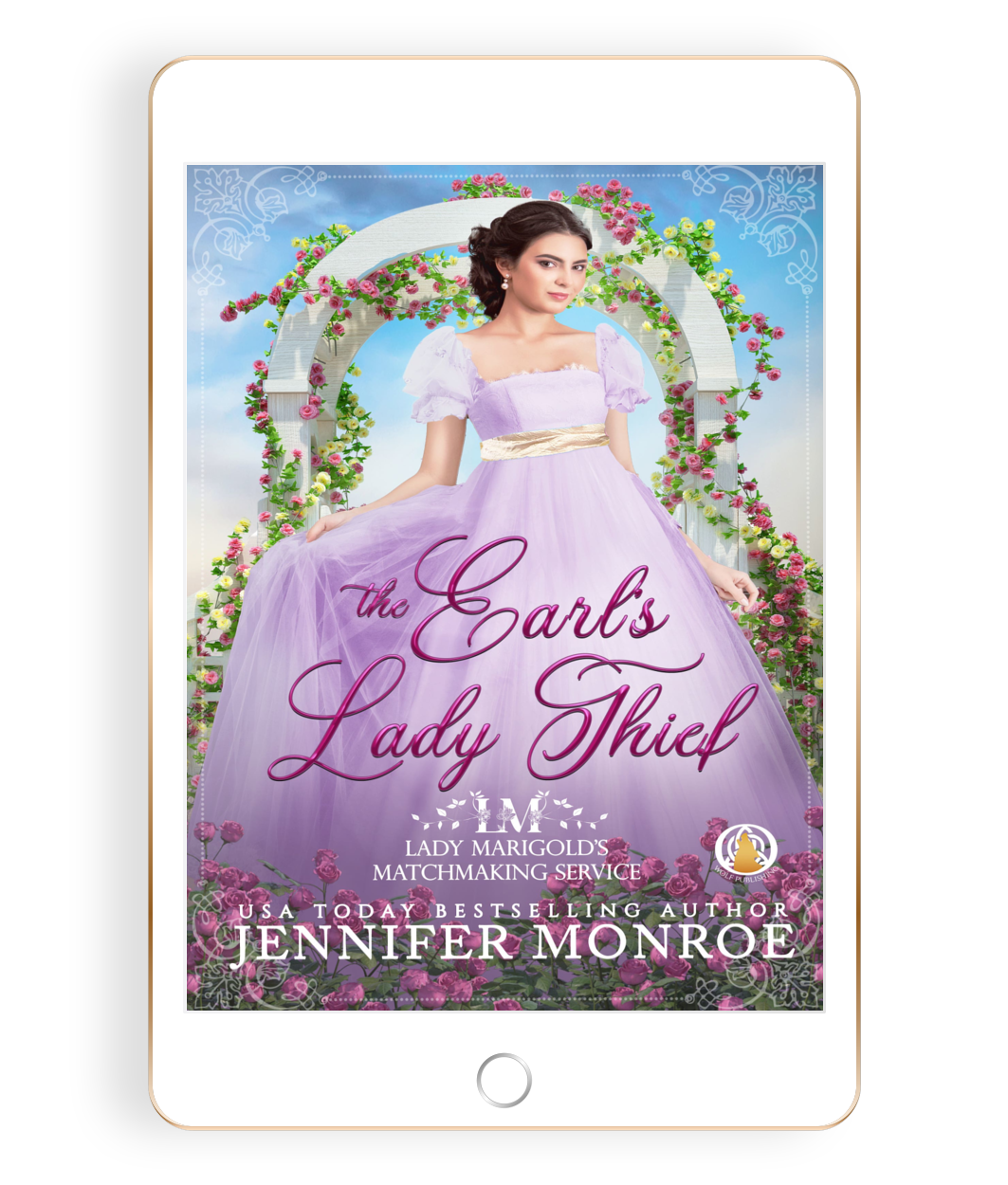Thanks to Wolf Publishing for an ARC of this book. It’s part of a new series from Jennifer Moore, and this is the second in the series I’m reading. This one is about Lady Olivia Burnsworth, daughter of an earl, and Jareth, Marquess of Montroy. Lady Olivia is such a prolific storyteller (otherwise known as a liar) that her father and stepmother are at their wit’s end. They engage the services of Violet, Countess of Whitmore, and her helper Lena. Violet is a matchmaker, something she took up after the sudden deaths of her husband and son within three months of each other. Olivia is taken to London to live with the countess who promises to find her a suitable husband. If she fails, Olivia will be married to a lecherous old man who has already expressed an interest in her. Eww.
The countess already has someone in mind for Olivia, the Marquess of Montroy. Jareth seems like a nice enough man. He isn’t averse to marriage, and would actually like to settle down, but he is too picky, finding fault with every woman he meets. When he meets Olivia, he’s initially bowled over by her beauty (as she is by his handsomeness), but he quickly decides she is not suitable for him because of her frequent tall tales. Upon reflection, he realizes she may be able to help him polish up his storytelling abilities. In exchange, he will take her to the theater and introduce her to Mr. Paul Harrison, an actor at the height of popularity. Olivia is convinced he is to be her husband, and she freely tells Jareth this.
For reasons I won’t bother to explain in this review, Jareth and Olivia become fake-engaged. As they spend time together, their banter is often quite amusing. I love how both of them are convinced that the other is flirting and cannot figure out how the other person has such a hold over them. When Jareth does something to offend Olivia, she is quick-tempered. “Olivia had a sudden vision of a large fire sweeping through a field, chasing after Jareth as he ran sobbing his apologies to her.” When she finds out he consulted his butler for advice on how to make things up to her, her response is priceless. “‘Your butler?’ she demanded, her eyes wide with shock. ‘Do you also go to your cook or spiritual advice? Perhaps we should consult a cobbler when we are ready to name our children?’”
Olivia is clever and quick-witted with a wicked sense of humor, ribbing Jareth mercilessly at times. Eventually, he recognizes her teasing is good-natured and enhances her natural intelligence, which he finds irresistible. And as he changes for the better, and Olivia realizes she doesn’t feel the same connection with Mr. Harrison, she grows to love him.
Let me tell you why Olivia earned the title of “The Lady Who Cried Wolf.” Because she told such extravagant and believable stories that often turned out to be untrue, her father dubbed her with that name as he warned her it might lead to trouble some day. Naturally, it does. Hence, the title of the book. But I’d like to offer a different one. Olivia wants, more than anything, to perform on stage. Jareth struggles with jealousy and his desire to protect Olivia, but he’s willing to allow her to live her dream when she tells him one time on stage will be enough for her. When she ignores his warnings about Mr. Harrison because she thinks they’re driven by jealousy, he’s forced to rescue her. Near the end, she admits, “Well, perhaps you are a hero, but only mine.” His response is, “And you…are my lady who cried wolf.” The logical response would have been, “And you…are my leading lady.” I mean, that’s what meant more to her than anything else, and this was supposed to be a tender moment between them. Why would he respond by teasing her with the derogatory nickname her father gave her?
Here’s my other complaint. Lord Walker, Jareth’s primary competition for a lucrative business deal, is a blowhard who brags about his accomplishments and acts as if he’s far superior to Jareth (and many others). When the business is granted to Jareth, Walker storms out of the room. But later, when Jareth acknowledges that it was a lie that helped him to secure that business, Walker responds by telling him that if the contract is offered to him after the truth is shared, he’d like to share it with Jareth. Then, he says, “Teach me how to admit to my wrongdoings, and I’ll teach you ways to improve how you promote yourself.” Based on the way Walker was described prior to this conversation, I don’t believe for one minute that he would have responded that way.
Also, I think too many exclamation points were used.
Overall, I enjoyed it. I didn’t know what to expect and was surprised several times. I recommend it, and I look forward to the next book in the series.





















